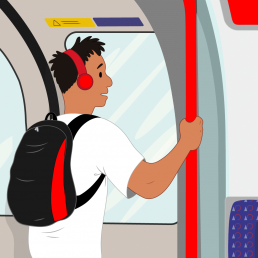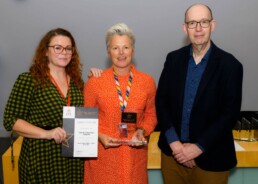Features | By Nick Chambers
Supporting our students during the cost-of-living crisis
Tackling the rapidly rising costs of living and studying in London has been the mission for staff across City.
In 2022 the ‘cost-of-living crisis’ became a household term and a concern for many. With prices surging for food, fuel and more, everyone has been affected and in different ways.
Rising inflation, the increase in global demand for oil, and the war in Ukraine have all been cited as reasons why costs are soaring, with consumers left to bear the brunt. Although many of these contributing factors are taking place abroad, the impact closer to home is keenly felt.
For students specifically, a survey published by the Office for National Statistics in February 2023 reported 91 per cent were either somewhat or very worried about the rising cost of living. As a university with a duty of care for its students, City was determined that the crisis was not detrimental to their studies and began to look at ways to mitigate the impact.
Asking students what support they needed

Staff from across City came together to see how best to tackle the issue and support students. One of the first tasks was to consult students and find out what support was wanted and needed. Working with the Students’ Union, a series of focus groups were set up, along with a Cost-of-Living Summit.
These highlighted that City students were being affected in several different ways. Some of their biggest financial worries included:
- Travel – many of City’s students commute and/or are international students who rely on public transport and air travel at a time when costs are rising. There were concerns they would not be able to visit family during the holidays or partake in social activities which are an essential part of the student experience.
- Accommodation – would landlords and accommodation providers increase rents, and would this see students ‘priced out’ of London and unable to stay?
- Employability – would they be let go from their current jobs as businesses sought to save costs? Would salaries after graduation be inadequate to continue living in London? For international students there was an additional concern as to whether companies would reduce the amount they would be willing to spend on sponsoring visas.
Implementing practical support
A university-wide group led by Louise Jennings, Head of Student Support Services, was tasked with refining and prioritising recommendations, supporting cases for financial support, and tracking and managing the progress of activities. Students taking part in the Students’ Union Cost-of-Living Summit identified four key areas where practical support would be welcome, which helped guide the group’s work.
- Catering – such as reducing the costs of campus outlets, increasing opening hours, as well as access to hot water and microwave rooms.
- Funding – providing more transparency with course costs, increasing funding for travel, and giving support with printing.
- Housing – producing a ‘trusted landlords’ register, providing additional support for housing issues and considering costs for halls of residence.
- Wellbeing – giving funding for neurodiversity testing, and reducing costs for gym membership to help support students’ mental wellbeing.
Signposting students to the right support
The Cost of Living Hub was launched in December 2022 to provide an engaging and accessible platform where students could learn how to access new and existing support.
Some of the key initiatives highlighted included:
- The Student Hardship Fund – the existing fund received additional funding to support a wider pool of students
- Shopping vouchers – frontline service staff refer students to the Student Adviser team, who offer vouchers to help with purchasing food and IT equipment
- Weekly community breakfasts – led by the University’s Chaplaincy team, students and staff come together to socialise over a free breakfast
- Low-cost evening meals – for students staying late on campus £3 dinners were introduced daily from 4.30pm-7pm.


Since its initial launch, further initiatives have been added to the Hub, such as a Travel Bursary that could be claimed retrospectively across the 2022/23 academic year, and free sanitary products that students and staff access from buildings across campus.

Initiatives with impact
Top level figures as of May 2023 show that students have made use of the support on offer.
£500,000
paid out through the Student Hardship Fund
£20,000
distributed for travel bursaries
£2,300
worth of vouchers provided for shopping and IT equipment
£2,700
low-cost evening meals served
City alumni supporting the next generation
Many of the initiatives have benefitted from the financial support of City’s alumni, with funds also drawn from the University’s Access and Participation Plan (APP), and from the Office for Students (OfS).
Abby Wilson, Head of Philanthropy at City said:
“Time and again, City’s fantastic alumni show incredible support for students in a time of need. From dealing with the impact of Covid, to now coping with the cost-of-living crisis, their generosity has made such a difference. Their support has made it possible to help students struggling to afford rent, food and IT equipment, and has no doubt enabled many students to continue their studies when they were otherwise at risk of dropping out.”
